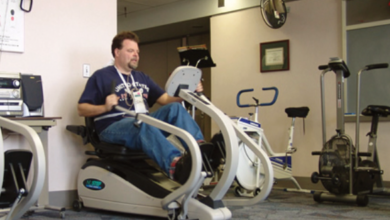Behind the Scenes: The Life of a Colon and Rectal Surgeon

When was the last time you thought about your colon and rectum? Probably not recently, unless you’re a medical professional or experiencing some discomfort. But did you know that there are doctors who specialize in managing diseases of these organs? Colon and rectal surgeons play an essential role in diagnosing and treating conditions like hemorrhoids, inflammatory bowel disease, and cancer. In this article, we’ll take a peek behind the curtain of the life of a colon and rectal surgeon – from their education to their daily routines – to gain a better understanding of how they help patients feel better “down there.”
Dr. Michael G. Staiti
Dr. Michael G. Staiti is a renowned colon and rectal surgeon who has made significant contributions to the field of colorectal surgery. He obtained his medical degree from Jefferson Medical College in Philadelphia, Pennsylvania, after which he completed his general surgery residency at The New York Hospital-Cornell Medical Center.
Dr. Staiti then pursued additional training with a fellowship in Colon and Rectal Surgery at Ferguson Clinic in Grand Rapids, Michigan. Since completing his training, Dr. Staiti has devoted himself to the practice of colon and rectal surgery.
He is an active member of several professional organizations including the American Society of Colon and Rectal Surgeons and the Society for Surgery of the Alimentary Tract.
Dr. Staiti’s clinical expertise covers a wide range of conditions affecting the colon and rectum such as inflammatory bowel disease (IBD), diverticulitis, fecal incontinence, hernias, hemorrhoids, polyps, cancer surgeries among others.
Patients appreciate Dr.
Staiti’s approachable bedside manner that puts them at ease during their most vulnerable moments; this trait makes him one-of-a-kind among other surgeons practicing today!
What is a colon and rectal surgeon?
A colon and rectal surgeon, also known as a proctologist, is a specialized medical doctor who focuses on the diagnosis and treatment of diseases related to the lower digestive tract. This includes conditions such as colorectal cancer, inflammatory bowel disease, hemorrhoids, anal fissures, and more.
To become a colon and rectal surgeon requires extensive education and training beyond that of a general surgeon. After completing medical school and residency in general surgery, these professionals go on to complete an additional fellowship program specifically focused on colorectal surgery.
During their training, they gain expertise in both surgical techniques specific to the lower digestive tract as well as non-surgical treatments aimed at improving patient outcomes.
Colon and rectal surgeons work alongside other healthcare professionals including gastroenterologists, oncologists, radiologists and others to provide comprehensive care for their patients. They often perform procedures ranging from minimally invasive surgeries like laparoscopy or robotic-assisted procedures up to complex open abdominal surgeries when necessary.
These highly skilled specialists play an essential role in helping patients maintain optimal health throughout their lives by providing expert care related to some of the most critical aspects of our digestive system.
The training and education required to become a colon and rectal surgeon
Becoming a colon and rectal surgeon requires a significant amount of education and training. After completing an undergraduate degree, aspiring surgeons must attend medical school for four years. During this time, they learn about anatomy, physiology, pharmacology, and other foundational medical topics.
Following graduation from medical school, the next step is to complete a residency in general surgery. This typically takes five years to complete and involves hands-on experience working with patients under the supervision of experienced surgeons.
After completing their general surgery residency, those interested in becoming colon and rectal surgeons must then pursue additional fellowship training. This specialized training focuses on diagnosing and treating diseases of the colon, rectum, and anus.
During their fellowship training period which lasts approximately one year or more depending on the program chosen by an individual surgeon-to-be – fellows gain extensive knowledge in areas such as colorectal cancer treatment options including surgical techniques for removing tumors while preserving bowel function; management strategies for inflammatory bowel disease; complex pelvic surgeries; among other things crucial to effective diagnosis
Becoming a skilled colon and rectal surgeon requires many years of dedication to learning and practice. Those who choose this career path are driven by their desire to help people overcome challenging health conditions affecting these vital organs that play important roles in digestion process within our bodies!
A day in the life of a colon and rectal surgeon
A day in the life of a colon and rectal surgeon varies greatly depending on their specialty, location, experience, and work setting. However, there are some general activities that most colon and rectal surgeons perform on a regular basis.
Typically, they start their day by reviewing patient charts to refresh themselves about each case’s background information. They then meet with patients for consultations or follow-up appointments where they discuss symptoms, diagnose conditions using imaging tests and other diagnostic tools available to them.
During surgeries, colon and rectal surgeons wear specialized apparel such as scrubs or sterile gowns to maintain hygiene standards. They use various instruments like scalpels during procedures while monitoring vital signs of the patient throughout the surgery.
After concluding surgeries or seeing patients in their clinics/office hours respectively, they document everything from progress notes to discharge summaries before heading home for the night.
Being a Colon and Rectal Surgeon requires an immense amount of skillful precision mixed with compassion towards your patients who trust you with their lives every single day!
The most common procedures performed by colon and rectal surgeons
Colon and rectal surgeons are trained to treat a wide range of conditions that affect the colon, rectum, and anus. The most common procedures performed by these specialists vary depending on the condition being treated.
One of the most frequent procedures is a colonoscopy. This is a diagnostic test used to examine the inside of the colon for any abnormalities or signs of disease such as polyps or tumors. During this procedure, a flexible tube with a camera attached to it is inserted through the anus into the colon.
Another common procedure is called colectomy which involves removing part or all of the colon due to cancer or other serious diseases like inflammatory bowel disease (IBD) and diverticular disease. A colostomy may be necessary after this surgery where an opening in your abdomen called stoma will be made allowing waste material out of your body into a bag that sticks outside your body.
Hemorrhoidectomy is also one of their primary responsibilities. It’s done when hemorrhoids become chronic causing severe pain and discomfort while sitting down or during defecation. Hemorrhoids are swollen veins located near your anal canal which can cause intense itching, bleeding and swelling making it difficult for patients to carry out everyday activities.
In addition to these surgeries, colorectal surgeons perform many other operations including fistulectomies which remove abscesses around anal glands and fissurectomies that help heal painful tears in Anal Canal lining as well as repairing prolapsed organs such as bladder repairs during pelvic organ prolapse surgery.
There are numerous types of surgical interventions carried out by Colon & Rectal Surgeons aimed at solving various complications relating to digestive tract disorders ensuring people maintain healthy lifestyles free from gastrointestinal issues.
The benefits and drawbacks of being a colon and rectal surgeon
Being a colon and rectal surgeon can be both rewarding and challenging. One of the benefits is that you get to make a real difference in people’s lives by improving their quality of life. You have the opportunity to help patients who are suffering from painful conditions like hemorrhoids, inflammatory bowel disease, and cancer.
Another benefit is that you get to work with state-of-the-art technology and equipment, which allows for more accurate diagnoses and less invasive procedures. This also means that surgery times are shorter, recovery times are faster, and there is less pain for patients.
However, there are also some drawbacks to being a colon and rectal surgeon. The job can be emotionally draining as it involves dealing with serious illnesses such as cancer on a regular basis. Surgeons must also stay up-to-date on advancements in treatment options which requires continuous education outside of their practice.
The nature of this specialty field may lead surgeons working long hours or having an unpredictable schedule due to emergency surgeries or patient consultations throughout the day.
Becoming a colon and rectal surgeon takes dedication but comes with great rewards- making significant improvements in people’s lives while advancing medical science through research efforts within one’s field.
Conclusion
Becoming a colon and rectal surgeon is not an easy feat, with many years of rigorous education and training required. However, those who do become surgeons find it to be a rewarding career that allows them to make a difference in the lives of their patients.
From performing life-saving surgeries to helping patients manage chronic conditions like Crohn’s disease or ulcerative colitis, colon and rectal surgery is a field that requires both technical skill and compassion for patients.
While there are certainly challenges involved in being a colon and rectal surgeon – from long hours to emotionally difficult cases – the fulfillment that comes with improving someone’s quality of life makes it all worth it.
If you’re considering becoming a colon and rectal surgeon, know that you’ll have the opportunity to work closely with patients, build relationships over time, and help people through some of their most challenging medical struggles. It’s not always easy work, but for those who feel called to this field, it can be one of the most fulfilling careers out there.




